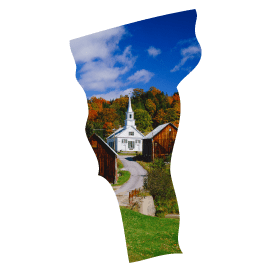Elementary Teacher Preparation: Vermont
Delivering Well Prepared Teachers Policy
Analysis of Vermont's policies
Although Vermont has adopted the Common Core Standards, the state does not ensure that its elementary teacher candidates are adequately prepared to teach the rigorous content associated with these standards.
Vermont requires candidates to pass the Praxis II general elementary content test, which does not report teacher performance in each subject area, meaning that it is possible to pass the test and still fail some subject areas, especially given the state's low passing score. Further, based on available information on the Praxis II, there is no reason to expect that the current version would be well aligned with the Common Core Standards.
The state does not specify any coursework requirements for general education or elementary teacher candidates, except to require that all teacher candidates in Vermont must complete a major in the liberal arts and sciences or in the content area of the endorsement sought. Although this provides an option for teacher candidates unable to fulfill student teaching or other professional requirements to still earn a degree, it offers little assurance that the courses chosen by elementary teacher candidates will prepare them in the topics relevant to the PK-6 classroom.
Vermont has articulated elementary teaching standards that allude to important areas of academic knowledge. For example, the state's science standards make mention of life sciences; physical sciences; and earth, environmental and atmospheric sciences. However, Vermont's standards lack specificity, leaving gaps in a number of important areas such as American, world, British and children's literature; world history; and art history.
Finally, there is no assurance that arts and sciences faculty will teach liberal arts classes to elementary teacher candidates.
Recommendations for Vermont
Require a content test that ensures sufficient knowledge in all subjects.
Vermont should ensure that its subject-matter test for elementary teacher candidates is well aligned with the Common Core Standards, which represent an effort to significantly raise the standards for the knowledge and skills American students will need for college readiness and global competitiveness.
The state should also require separate passing scores for each content area on the test because without them it is impossible to measure knowledge of individual subjects. Further, to be meaningful, Vermont should ensure that these passing scores reflect high levels of performance.
Provide broad liberal arts coursework relevant to the elementary classroom.
Vermont should either articulate a more specific set of standards or establish more comprehensive coursework requirements that are specifically geared to the areas of knowledge needed by PK-6 teachers. Further, the state should align its requirements for elementary teacher candidates with the Common Core Standards to ensure that candidates will complete coursework relevant to the common topics in elementary grades. An adequate curriculum is likely to require approximately 36 credit hours in the core subject areas of English, science, social studies and fine arts.
Require at least an academic concentration.
Although Vermont's policy requires that elementary teacher candidates have an arts and sciences major, the state's language does not ensure that these teachers will earn a content specialization in an academic subject area.
Ensure that arts and sciences faculty teach liberal arts coursework.
Although an education professor is best suited to teach effective methodologies in subject instruction, faculty from the university's college of arts and sciences should provide subject-matter foundation.
State response to our analysis
Vermont asserted that NCTQ's analysis is both misleading and inaccurate. The state pointed out that its cut score for the Praxis II elementary content test is higher than the average for the 26 states that use this test: The average is 145.7; Vermont's cut score is 148. Further, all teachers are required to hold baccalaureate degrees from regionally accredited or state-approved institutions and must have successfully completed a major, or its equivalent, in the liberal arts and sciences, or in the content area of the endorsement sought, which would necessitate that candidates be taught by faculty in the liberal arts and sciences.
Last word
Although Vermont's cut score for the Praxis II elementary content test ranks high among other states, it is still nearly one full standard deviation below the mean of all test takers, according to the latest Praxis Technical Manual from ETS (see figure 7). Also, Vermont's requirement of a liberal arts and sciences major does not ensure that candidates will complete an academic concentration.
Select another topic
Delivering Well Prepared Teachers
- Admission into Preparation Programs
- Elementary Teacher Preparation
- Elementary Teacher Preparation in Reading Instruction
- Elementary Teacher Preparation in Mathematics
- Middle School Teacher Preparation
- Secondary Teacher Preparation
- Secondary Teacher Preparation in Science
- Secondary Teacher Preparation in Social Studies
- Special Education Teacher Preparation
- Assessing Professional Knowledge
- Student Teaching
- Teacher Preparation Program Accountability
Expanding the Pool of Teachers
Identifying Effective Teachers
- State Data Systems
- Evaluation of Effectiveness
- Frequency of Evaluations
- Tenure
- Licensure Advancement
- Equitable Distribution

